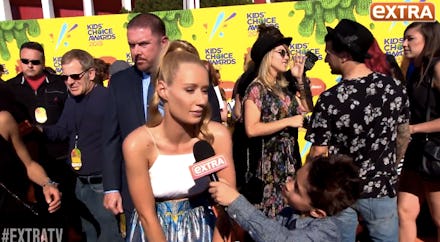Iggy Azalea Had an Amazing Response to a Child's Question About Her Breasts

Iggy Azalea recently discussed with Vogue her decision to undergo a breast augmentation, and thus likely expected to field questions about it on the red carpet. But she probably didn't expect those questions to come from a 10-year-old at Nickelodeon's Kids' Choice Awards last weekend.
"You talked about getting work done," General Hospital child actor Nicolas Bechtel, who joined Extra as a red carpet correspondent for the event, said. "Why did you feel the need to be open and tell people?"
Though clearly taken aback, Azalea didn't miss a beat. "It's so common," she said in reference to plastic surgery. "And I knew so many people in my regular life who had done it and had a good experience and I never see any celebrities talk about it. Although I know 80% of them have done it, too."
Azalea explained she has chosen to speak out to "tell women that might be thinking about my experience [and] that it can not necessarily be a bad thing."
While Azalea's decision to alter her body based on narrow societal ideals may not be widely championed as a feminist victory, she does raise a salient point: Many women do choose to undergo plastic surgery, yet feel too ashamed to speak openly about it. No matter their stance on procedures like breast augmentation, most feminists would likely agree the stigma that prevents women from discussing their bodies and personal decisions has got to go.
And although Azalea's assertion that 80% of celebrities have had plastic surgery may be conjecture, she raises another issue that's important for children to hear (even if the answer was broadcast on Extra): The female bodies that are typically celebrated in media may not have achieved their aesthetic naturally.
Studies have shown that while it's not the only factor, media exposure contributes to messages that encourage 80% of 10-year-old American girls to go on a diet, and more than half of girls age 6 to 8 to indicate their "ideal" bodies would be thinner than their actual bodies. Thus it's arguably important for them to recognize that there is nothing wrong with them if they don't look like the bodies championed by the media as perfect.
What's more, while many have expressed discomfort about the interviewer's young age, this interaction — though perhaps uncomfortable to watch — is a crucial reminder that children regularly engage with the media and its many potentially damaging messages at increasingly young ages (even if Bechtel's question was probably written for him to ask).
Whether Azaela's decision to have plastic surgery is itself a feminist act is up for debate. Her approach to discussing it openly and honestly with the media, however, is a clear step forward in the context of a society that often holds women to impossible double standards and immerses them in shame in all matters related to their bodies. Rather than write off this admittedly troublesome interview, those with children in their lives should view it as evidence that it's crucial to engage kids about topics like body image before celebrities — and the culture that shames them — does first.
h/t Washington Post